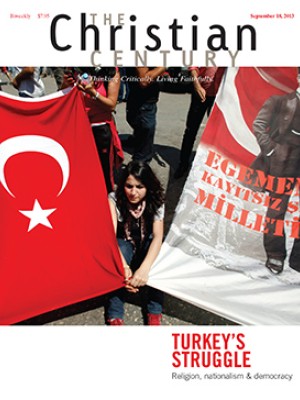Sunday, September 22, 2013: Luke 16:1-13
On a wall in Stockholm’s cathedral hangs a huge 17th-century painting of the Last Judgment that depicts the falling bodies of the damned. On a recent visit to that church I gave the painting little more than a glance. A longer look might have found something of beauty or interest, but my reaction just then was to wish that it were not there. The ugly, violent painting was not something I wanted visitors to see as representative of my faith. Thank God, I thought, that it hangs where a tourist could easily overlook it.
Of course, I know that images of wrathful retribution reflect a long history among us, that many believers still subscribe to such an eschatology, and that many nonbelievers assume that its teaching is essential to what Christians must believe. But for me and many others the church’s heart and gospel lie far from the nightmare of eternal punishment. Urgent human issues of hope and healing and solidarity may be said to have displaced the ancient fear of an angry and punishing God. When I encounter divine wrath in scriptures, I don’t hear my perdition but instead a rhetoric of passion, of frustrated love so desperate as to resort to threats and curses. And when I speak the credal words about judging the living and the dead, I hear myself affirming a hope and dream that there will one day be justice and vindication for all those who never got them in this life. In that imagining I summon up defiant courage and hope.
Read our latest issue or browse back issues.
Yet for all that, I am haunted by fears that may be kin to those of the generations before me. They come to me when I hear this story about an unfaithful steward called to account. We don’t know whether the wasting of his master’s property was by greed and embezzlement or by mere uncaring delinquency, but the point is that the auditor was coming and the servant was going to be exposed as a fraud.
The fear of an accounting is with me too. It’s not just one single failure or shame that brings forth my unease, but the thought of all my life’s dishonesties, broken promises and greedy indulgences exposed. It’s the knowledge of how poor my stewardship of all the undeserved advantages of my life has been, how much I’ve squandered, how careless I’ve been with the environment and how complicit in its destruction. I recognize too my unjust privilege as one in the tiny percentage of the earth’s population that enjoys so much wealth.
Even if hell’s horror no longer lives in us as it did in our forebears, a similar anxiety remains: that our shame will be known, that nature will exact its vengeance and that our “unrighteous mammon” will fail us.
Our faith’s ultimate answer to this anxiety may be found in the paschal grace that transfigures even shame and death and casts out fear. But Jesus’ story here is making a different point, one that he would bid us learn from “the children of this world.” The dishonest steward was right not just in that his world was about to come crashing down around him, but also in that he needed to hustle to save himself. His fear was a goad to doing something.
What he did, of course, was “to make friends for himself by means of unrighteous mammon.” He allied himself with the master’s debtors, thus establishing new relationships of mutual interest on which to build a new life when he was kicked out of his old one. He was shrewd enough to have the debtors themselves write up the charges—a collusion that gave the debtors their own moral agency and bound the steward and debtors in partnership.
Then, with an unexpected twist, the story concludes with the master, the putative representative of divine justice, commending his dishonest servant, then with Jesus himself bidding his followers to learn something from this sneaky little hustler. (Then our evangelist immediately rushes in to supply other words from Jesus about the moral value of honesty and faithfulness, an intended corrective that has greatly confused both readers and preachers.)
“You can’t buy friends,” we say wisely, but Jesus says that that is precisely what we should be doing. He is speaking another truth. Friendships and relationships involve spending treasure, both tangible and intangible. The treasure may be tainted and our possession of it unjust, but the point is to use it while we have it, before the dreaded accounting comes. The steward was not passive or slow in his anxiety; he hustled to make friends among the debtors.
Exactly what this suggestive image of making friends among the debtors means in our time I do not entirely know. I know there are many debtors in this unjust world, both nations and individuals struggling under the burden of insurmountable debt. I know that although some see the forgiveness of debt—or of sins and offenses—as a kind of unfairness, it can be the only way forward. And I know that Jesus speaks of a future where tables have turned, the lowly been lifted up, and that it is on the poor that the wealthy will have to depend for hope of any abiding home.
“Be not afraid,” Jesus says, but perhaps knowing that we do fear, he bids us feel that goad, bids us hustle, bids us use our unjust wealth creatively while there is still time. We, the children of light, may need such darkly urgent fear.






